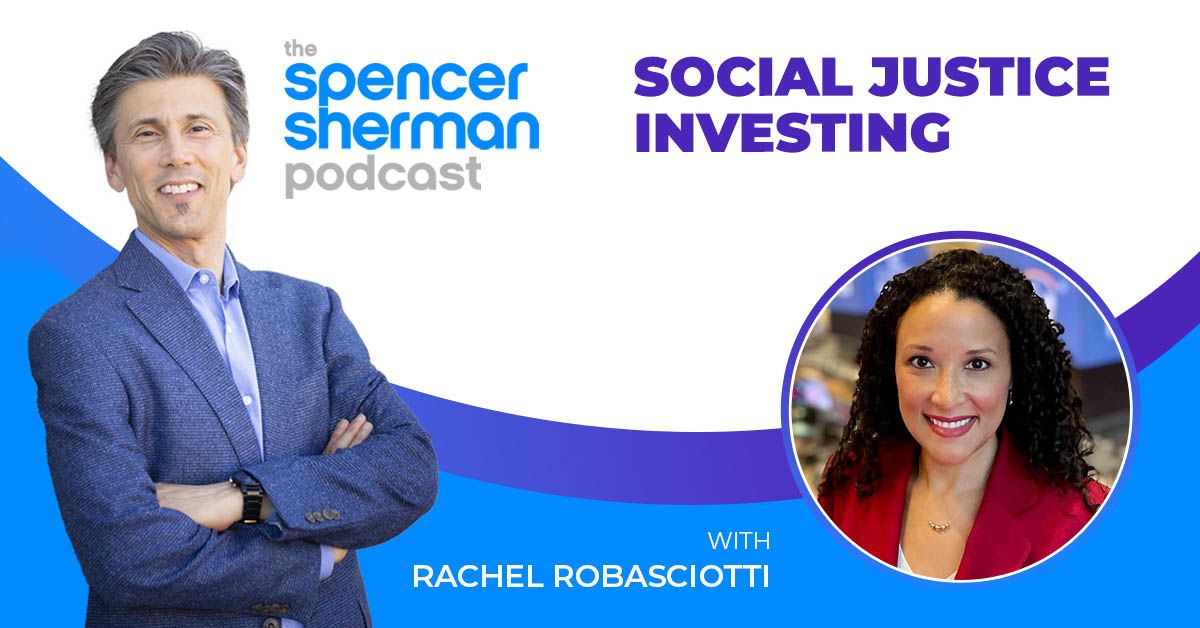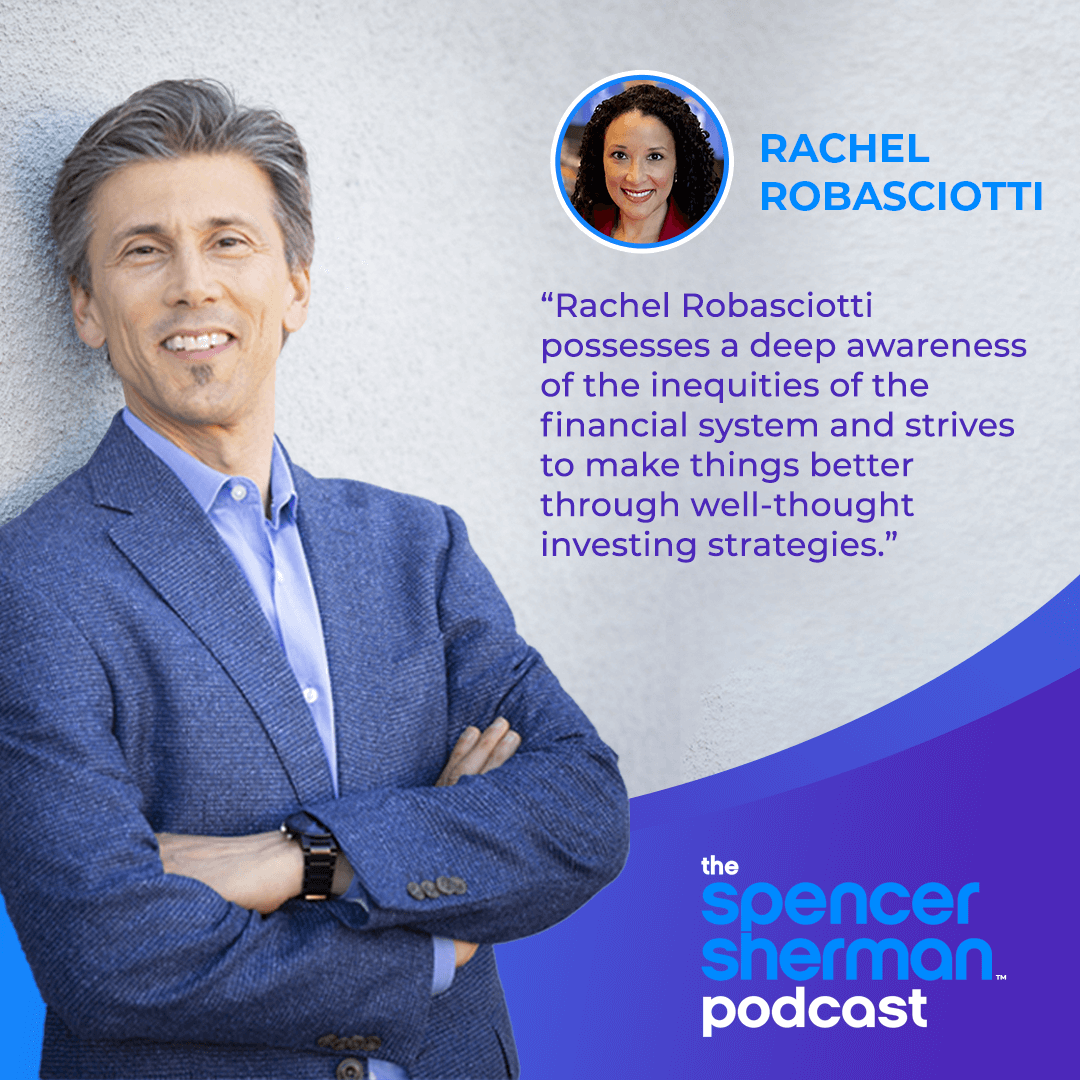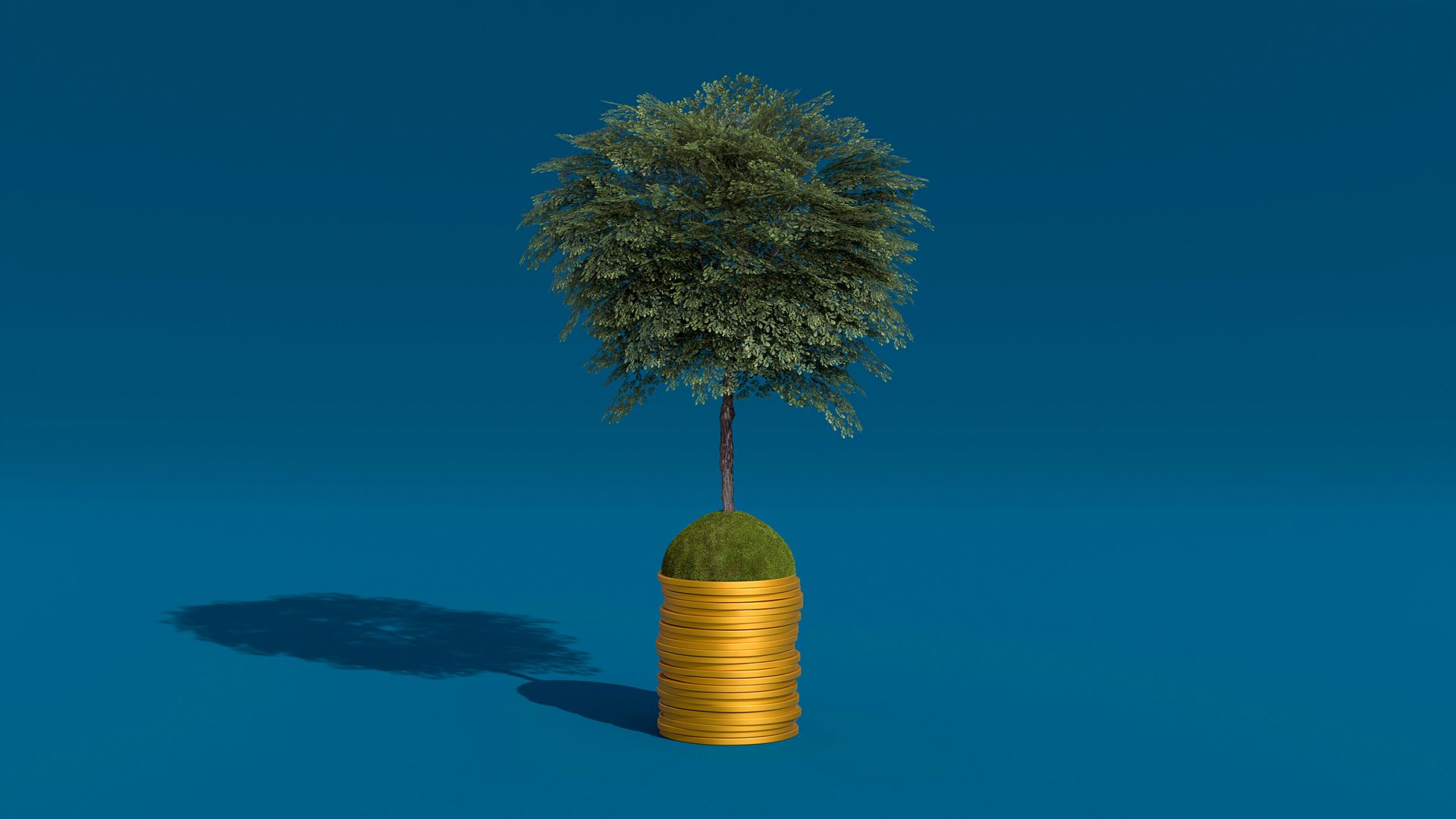
What is a good investment? Who should benefit from it? In this episode, Spencer Sherman welcomes Rachel Robasciotti, the founder of Adasina Social Capital, to dive into investing long-term for future generations through social justice investing. There is a pressing need to address the social inequities and overcome systemic challenges. In the financial market, Rachel sees the key in pulling together our collective resources to produce widgets and resources to resolve large systemic inequities. Together, we can invest in building a sustainable and successful world to live in for the future. Join in the conversation and learn how.
---
Listen to the podcast here
Social Justice Investing With Rachel Robasciotti
I am here with Rachel Robasciotti. Welcome, Rachel.
Thank you so much for having me. I'm happy to be here and to speak with you about social justice investing.
I'm so excited to speak with you about this topic. What I have found over my decades of being a financial advisor is that we have these beliefs that often keep us individually and collectively from having more freedom and success in the financial world. You have had such great successes in many realms like starting your own mutual fund, your own advisory firm, and all the work you have done on a national and global level.
I'm so excited to be here with you, and I’m grateful for all that you have done to help all of us rise up and have that much more freedom and intelligence around our finances. Thank you for all you have done so far in the world. Let's dive in. I'm wondering when you first became aware that there were financial inequities in our financial system? When did you first start having these thoughts that there's something that we could do to make things so much better?
In order to answer that question, I need to tell you a little bit about my life. I live in San Francisco now, but I was raised in a poor and still largely segregated community in a town called Oroville, California. Oroville is in the foothills of the Sierra Nevada. If you are thinking based on 1980, I want to let you know that my particular town has a history of extraordinary measures to resist social progress. They are that town that declared itself a constitutional republic away from COVID mandates in November 2021. I grew up there.

If people know about Oroville at all, they know about the Oroville Dam. It was built in the 1930s. It's the tallest in the United States. The Black population that arrived there moved up during the Great Migration to take these high-risk jobs building the dam. They were allowed to live on the south side of town. The Black families on the south side were primarily led by women, and that was a direct result of over-policing that we are becoming increasingly aware of in Black communities.
Most of the Black men in my family were incarcerated or killed by police officers, which is not an overstatement. I have had three different family members killed by police officers with no repercussions for those officers. That's not an uncommon story. It may be an uncommon story within the financial services, but it's not an uncommon story in the Black community.
That alone would have a tremendous impact on one's life.
I had this overwhelming sense that something wasn't right. A lot of the issues that we experienced, there was a lot of unemployment, jobs were hard to come by, they were particularly hard for women to come by, and we were chronically poor. I was homeless multiple times. We suffered from all of the issues that come with chronic resource deprivation, which are preventable diseases and premature death.
These ideas of racial, gender, economic, and climate justice were certainly deeply embedded in my growing up, and they are still here in the present because most of my family still lives there. I have to tell you that climate justice didn't come to my consciousness to round those areas out until the Oroville Dam almost collapsed in 2017. That was after extreme weather through the 2010s that put stress on critical portions of the dam.
Wouldn't you know it, it was the south side of Oroville when we looked at the flood inundation maps that were most likely to collapse in the event of a flood. The Black community was redlined into living there. It was a community mostly of women, chronically poor, and was the most at risk of climate change. We saw what the residents in the Ninth Ward saw during Hurricane Katrina, which is this profound inequity.
There are so many ways in which money was tied up in it in impoverishing that community and extracting its labor. It became very clear to me. I already had a lot of clarity about the intersection of racial, gender, and economic justice, but the climate piece became crystal clear to me in 2017. I already was a financial planner. I wanted more solutions for our clients, and I couldn't find them. My clients and I wanted a solution for, “How can we take our collective resources like investment dollars to address the inequities I grew up with?” Thankfully, I graduated from high school at fifteen. I started a financial firm at 25.
Did you graduate from high school two years early?
Yes. I was very aware and very motivated at a young age. Tragedy will do that. That's how we became Adasina Social Capital. We were making solutions in public markets to advance racial, gender, economic, and climate justice. I have a long story, but it's not been part of my consciousness. It's just gotten a finer point.
When one sees all these blatant limitations put in by others, the systems where certain people are very much disadvantaged relative to other people, how does one overcome the beliefs that one might have from that? It sounds like you somehow got empowered and finished high school early and said, “I'm going to address this.” I can imagine that so many people feel hopeless after seeing those systemic challenges.
Thankfully, I grew up in a tight-knit community. One of the silver linings of tragedy is that those who are facing it together have to band together and have any semblance of joy in life. I had a deep sense that we can do anything collectively. We may have trouble as individuals overcoming huge systemic pressures, but we can do anything if we come together collectively.
Those who face systemic challenges have to band together to survive and have any semblance of joy in life.
I realized that these big systemic challenges of our time required big collective resources. As I learned more and understood the world more, I understood that most of our resources as a society are inside of financial markets. If we want to address these huge systemic problems, we have to pull together our collective resources. We have been pulling those collective resources together to produce widgets and services. There are ways that we can pull our collective resources together as we are investing in companies in order to start to resolve some of these large systems that extract from many often for the benefit of a few in society.
Rachel, it's so great to have you here to voice the challenges that many people have faced and are facing, and how you saw the light at the end of the tunnel. It’s like that light was saying, “This is where the money is.” The money is in the financial system, and we need a lot of money to fix these barriers to a more just, equitable, sustainable, and successful world. Why not go towards the system, which in some ways is very logical, but in other ways, I would imagine that many people feel, “I can't touch the financial system.” How did you overcome that? That's a thought that I think I would have. How do you go after the whole financial system?
The work has always been about what we can do together. As an individual, I don't think so highly of myself that I believe that I as one individual can take this on. However, what I did know was that there are many other people who feel similarly to me and that people are looking for answers. What I also knew is that those who are in power, which means those that are directing the investment dollars aren't necessarily those who are closest to the problem.
If you need new and nuanced answers to fixing a problem, it makes the most sense to go to those who are closest to the problem and often sadly, farthest away from power. When we started looking for solutions, we didn't assume that we as a company or I as an individual knew that the basis of what we do at Adasina is partnering with the most impacted communities. It means the communities that have the most under systems that perpetuate racial, gender, economic, and climate injustice. We ask them, “What do you need? What does it look like to make an impact on this system rather than assuming that we knew?”
Give us an example of some of the answers you received when you asked those questions to one of these disenfranchised communities.
Shortly after George Floyd was murdered, we had already been partnering with the Movement for Black Lives around issues of racial justice, and what investors could do to help overturn this system of racial injustice that had perpetuated itself in our country and throughout our investments as well. They had told us to focus on mass incarceration. The system disproportionately imprisons Black and Brown people, and there are these systems for creating a profit where that's concerned. They had asked us to focus there.
It was interesting. Once George Floyd's murder became internationally known, there were many people in the investment world who started to turn their attention to doing something about racial injustice and not asking the communities that are most impacted. They started looking at diversity, equity, and inclusion policies at companies. It is absolutely important to be looking at those issues at a company but I have to tell you that if you talk to the Movement for Black Lives, they say those are fantastically important issues, and it's a little bit like counseling someone who's having a heart attack on their diet.
Does their diet need to be addressed? Absolutely. Do Black people need more jobs and be treated more equitably at work? Absolutely. Is that what put the knee on George Floyd's neck? No, not necessarily. A system of mass incarceration that used the police to funnel folks into that system, that's what put the knee on George Floyd's neck. We were very successful in turning the narrative back toward mass incarceration nationally and not letting investors go with what they thought was best, but focusing deeply on what the Black community said would be most helpful. We have made tremendous strides in that area.
What I'm hearing, Rachel, is that you have continued to put your attention on where the most impact can potentially be.
Yes, and who decides what is impactful because there are many things that we can do to have an impact and with a limited set of resources, investors need to be focused on what the communities who are most impacted are telling us would make the biggest difference. That's not something that we have historically done in finance. We purport to have all the answers. It takes an incredible amount of humility to find what's most impactful.
If someone is reading this, and let's say they are focused on economic success, their own success, or the country's success, I believe that what you are saying folds into that person's desires. Maybe you could say something about how that might sound counterintuitive to some people, but that the success of these disenfranchised people is a segue to success on a national and global level.
Yes, that's an important point to look at. We do this work not only because we are from these communities that have been marginalized. Myself and our staff people are from these communities and want a different outcome than we have had so far. We also do it because ultimately, I believe what we all want, as investors, is to have a true return on our money, which means that personally, we want to make more money over time but our true return isn't just our personal financial return. It's also your social return.
I can make this point very easily if I'm doing well financially, but my sister is not, that has a direct impact on my well-being, and it will end up also having a direct impact on my finances because I will want to use some of my money to change her situation. It's a fiction that personal financial return can be separated from social return.
That answers my question that when we are focused on ourselves individually, we get less return than when we focus on the collective because we are so interconnected.
I do see this beginning to change, but so far, we seem to have this orientation toward the parts of our nation and our world that are most hurting. In finance, we seem to have this orientation that's like, “Let's not think about them. Let's focus on making more money.” The trouble is that's a little bit like ignoring a wound that you have on your arm. If you simply ignore it, it won't go away. It affects the health and sustainability of the whole system.
We have seen this in how much these huge social ills are disrupting our day-to-day lives and at times, even the financial markets. They are inextricable personal and social returns. What I'm doing is simply shining a light on how deeply interconnected they are because no one would want to invest in a world that ports the destruction of the planet and harm to other individuals. However, we have become accustomed to separating that off as though it does not matter, and yet we can't get away from it.
Our investment decision is about making more of something. Do we want to make more harm and extraction in our world? What does that do to us as individuals? Even if I am not the one who's at the most disturbing end of it, what does it do to us as moral human beings to have invested in a world with more harm? We are going in a different direction with it.
Many clients will say to me, “With the market going down, how do I know this isn't going to snowball and it's not going to keep getting worse and worse?” What I hear you saying is that it could get worse and worse if we don't do something about the sustainability of the planet, our social dynamics with each other, and our ability to get along with each other.
These are key issues that support the financial success of the stock market. These are all interrelated. What I hear you saying and when people are worried about the future of the stock market, maybe we should all start to focus on the foundations of the stock market, which I hear you saying are things like sustainability and racial justice.
Yeah, social stability. When you extract from and harm a particular segment of your society, you create social instability. It can even go as far as social unrest, and that is something that's not good for our long-term investments.

In some ways, what you are talking about is financial security. I'd love to hear, if you had your way with this financial system with the world, what are 1 or 2 things you would love to be able to achieve in the next year or two? What's your vision for the world for what this financial system might be able to provide for all of us if we could turn some things around, turn around our beliefs, and put in place some of the ideas that you have been playing with in your mind?
I can talk about my long-term vision and then also, the shorter-term things I would want to achieve. My long-term vision and purpose are to transform what it means to be a publicly-traded company. I want you to know what it's meant so far. What it's meant so far is that companies that were smaller and needed to raise money from investors in order to grow wanted to raise money from many people from the public.
To do so, we put in certain rules and responsibilities. If you are going to raise money from the public, then you are responsible to the people whom you raise money from. Somewhere along the way, the companies got very large but stopped being responsive to and accountable to the public to whom they owed their growth, to begin with. What I want to do is no less than transform the meaning of a public company.
I want it to be impossible to be a public company and not do work that is for the public good and not do work that is for the benefit of the public. When you are extracting from people and when you are extracting from the planet, these are not things that are adding to social good. These are the things that are taken away from it. I want to transform what public companies are from something that's parasitic on society to public companies that re-inhabit the core meaning. We raised money from the public. We are accountable to the public. We are creating things that are public and social goods.
If the average person is reading this a year from now and everything you have said comes to be, how would they know that? What would they notice that's different about the way public companies are operating or the way the financial system is operating?
I can tell you some of what we are working on now. Being a public company would mean that you must pay the legal minimum wage under all circumstances. Now, public companies do get away with paying a sub-minimum wage. They are violating the law often and the Justice Department has given up on pursuing these issues. It's primarily about tipped workers who supposedly are getting the full minimum wage that's made up for with tips, but they don't.
Being a public company would mean you always have to follow the law and pay a full minimum wage. That's an issue that impacts people of color and women as workers. It leads to extensive poverty in our country of over eight million workers that are in the service industry and are impacted by this. As a public company, you shouldn't be able to profit from mass incarceration that happens on systemically racist terms and as a direct descendant of slavery, the way that we incarcerate people in this country.
That's something that we continue to work on, is dismantling the system of profiting from mass incarceration. Looking at climate, we continue with the fossil fuel divestment that our entire financial system at this point is moving toward. The place where we haven't finished the job yet is around extractive agriculture. It's a piece that is part and parcel of the entire petrochemical industry. It has profoundly negative impacts on both the people who are employed or exploited by extractive agriculture and also the planet.
Dismantle the system of profiting from mass incarceration.
Most people don’t know this, but the most conservative estimates say that up to 30%, if you get more aggressive, some of the estimates say 50% of all carbon emissions come from the extractive agricultural practices of public companies. We'd open up investors' eyes on that issue and make some serious progress toward divesting, toward taking a step back and saying, “We don't want to make more of extractive agriculture. There are other ways to do sustainable and local feeding of the planet.”
What you are saying is that a good percentage of the carbon emissions are not coming necessarily directly from oil production. It is coming from the way we do agriculture.
It's not that it's not coming from oil. It's that oil, gas, and fossil fuels are so heavily relied upon and used in the industrial agricultural system. They are intertwined. We use petrochemicals in our fertilizers and our pesticides. We are also using vast amounts of fossil fuels in the transportation and management of extractive agricultural practices.
It seems like these issues, while they are large, like the one about mass incarceration and extractive agriculture, are issues where there's a lot of consensus and agreement. Especially on mass incarceration, across the political spectrum, there's a lot of support for all the savings that we can accrue from dismantling a system that has cost us on so many levels.
Yes, there is. It's interesting because so often, I get that question. It's like, “The different social justice organizations that represent these communities, how do you get them to come to an agreement? Don't they all want to work on different things?” What's interesting is that if you truly focus on working with the organizations that have leadership directly from the communities that are most impacted, folks are saying the same thing across the board.
It might have slightly different flavors regionally. For example, in the Gulf Coast area, they are very worried about the impact of climate change on the oil and gas industry on their fisheries. However, if you go farther up the Mississippi River, they are very worried about the impacts on communities of the overuse of pesticides and fertilizers and what it's doing to the rivers and streams and the soil.
They are all worried about extractive agriculture. They have a slightly different take on it but when you get down to the core issues where investors and our collective resources can be brought to bear, you do find a pretty easy alignment on these issues. They aren't fundamentally disagreeing with one another, they just have different applications regionally.
Rachel, would you say that there is almost an over-focus on the very short-term and the way that we ignore the implications of anything beyond the next couple of weeks or something in terms of the effects of how we are handling things agriculturally? Also, the prison system that we do immediate fixes that often don't even benefit us in the short-term but they certainly hurt us in the long-term.
I'm wondering, how do we start to shift our mindset a little bit longer term focused? How do we shift our mind so we are not thinking in terms of, “I have got to farm my land in this way to produce a good output this week, but I got to also think about the next five years?” How do we make that shift in our minds?
In a certain way, as human beings, we are motivated by what works, and what works in the short-term can feel a lot more compelling than the long-term. We also have to remember that when we are investing, we are engaged in a long-term proposition. Most people who become investors become aware that the investors that make money and that have the lowest risk of losing their investment are the ones who are long-term investors. This doesn't require lots of fancy algorithms. If you think about it, if you are a long-term investor, the only thing that you are interested in is sustainable long-term returns.
Just so we are all clear, for everyone reading, I assume you are saying 5, 10, 15, or 20 years is what you would say is the longer term?
A lot of us are investing for our retirement. It’s definitely beyond five years. We are looking at the 10, 15, and 20 years as well. If what you want is long-term sustainable financial returns, you are only going to get that one way. That is with companies that are committed to having sustainable practices long-term. It starts to become very obvious if your business model is profiting off of a systemically racist system of mass incarceration and things that are ultimately unfair.
There's a universal sense of fairness that we have across left and right, blue and red, across cultures and countries in the world. We have a fundamental sense of fairness and things that are unethical tend to become illegal. How long can you get away with exploiting one particular community? If you start to look at exploitation as an unsustainable practice, you start to have a clear sense of like, “Exploiting people on the planet doesn't work out long-term.”
The long-term best practices have to be curved, partially because we want a fair and just society, but also eventually, you have social unrest related to those as we have seen many times. It comes out to this fundamental question, “What are long-term sustainable companies?” They are the ones who are working in the public interest and producing social goods, as I was talking about.
What's amazing and what's giving me goosebumps about what you are saying is that some of us invest with this idea that it's all about making money. You are connecting the dots and saying that making money is also a healthy planet that we are investing in for the long-term. As these two ideas come together, long-term investing is connected to a sustainable planet, a just planet, and they go hand-in-hand. It's like, “We can have our cake and eat it too.” The things that are going to be good for the planet are going to be good for our long-term portfolios, is what I hear you saying.

We do not have planet B to move to. It comes down to this question, “What's the future you are investing in?” Is the future that you are investing in a planet that you, your descendants, and future generations can live on and can live on in peace? Is that the future you are investing in? If so, you must invest sustainably now.
I love this because it brings me to one of my last questions, which is, many people say, “The system's so unfair. I don't want to be part of the system.” What I hear you saying, and please confirm that there are ways to invest where you are moving the planet in the right direction. Also, these two worlds, the financial world, the environmental world, the social justice world, and the prison world are all connected. They are all related to each other. We can't separate these out is what I'm hearing.
We can't separate them out. I will end by making a very old point, which is the world that we are living in right now with mass shootings, with COVID killing a million people in the United States, with extreme weather events that are threatening already disadvantaged communities. The world that we are living in right now is the direct result of a false narrative about finance. That false narrative was that you can invest and only have an impact on your personal financial return. You can invest and have it just be about money. It's not true.
The world we are living in is the direct result of the investments that we made many years ago. I am speaking from our future. I'm speaking back to the present and saying, “If we want a different future than the one that we have right now, we are going to have to invest differently.” That different way of investing is social justice investing. It’s one that looks deeply at the sustainable practices that support racial, gender, economic, and climate justice. Not only because we want a sustainable world, but because they are inextricable from looking at our financial futures. Our financial futures don't happen in a vacuum. They happen in a world with other people.
We are so interconnected from the most ordinary thing of smiling at someone as you are walking on the street to the way we do our agriculture or the way we do our system. The way we handle everything in this world and this country is connected to this investment system that we are invested in. When we buy a mutual fund, we are part of this system. If we want long-term growth in our mutual funds and our portfolios, it's natural for us to want these inequities to be resolved. They go hand-in-hand. This might sound a little crude, but one can almost say that if you were a selfish person, you would be in favor of everything Rachel is saying.
It’s true. As I said, there's no financial future where you have made lots of money and it did not have some impact one way or another on other people, the planet, and on you as well. All investment has an impact. What do you want the impact to be? I prefer to drive and have clear visions heading into the future. Driving toward the future with blinders on saying that all we care about is our financial return will get us more of the future that looks like the present. I don't think any of us want that at this point. We are looking for a new future, so we are going to have to choose new ways of being.
All investment have an impact. There's no financial future where you have made lots of money that have some impact on other people, the planet, and you. What do you want that impact to be?
Everything you are saying folds into that we have more power than we think to shape this world so that there is long-term sustainability of the planet, of our investment portfolios, and that the stock market is a reflection of our daily actions.
Thank you so much for having me.
Thank you so much. This has been amazing. Rachel Robasciotti, thank you again. I wish you well. May all your actions, your brilliance, and your courage keep going. May you continue to help this planet flourish. Thank you for all that you are doing and will continue to do.
Thank you for having me. If any of your readers want to stay connected to what we are doing, it's very easy to join the Adasina Community. You need to text the word, JUSTICE, to 55444. You will get signed up for our newsletter which will keep you connected to issues where social justice and investing connect. Again, 55444 is the number and you text the word, JUSTICE, so we can stay in touch and continue the conversation.
Bye for now. I'm wishing you well.
Bye-Bye.
Important Links
SHARE THIS POST
The road to financial freedom is easier when you share the journey. By signing up for Spencer’s newsletter, you’re joining a growing community of people who’ve found their way to “Enough.”





